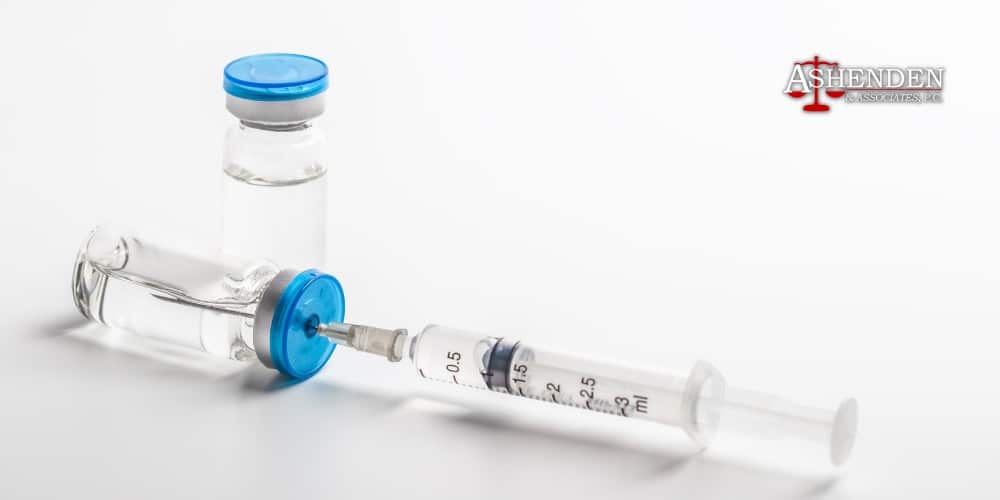We Go The Extra Distance For Our Clients
Home » Depo Provera Lawsuit
Practice Areas
Depo Provera Lawsuit
Depo-Provera Lawsuit Attorneys Representing Meningioma Victims Throughout Atlanta and Sandy Springs
Thousands of women trusted Depo-Provera for long-term birth control, only to face life-changing health consequences. If you were diagnosed with a brain tumor after receiving this contraceptive injection, a Depo Provera lawsuit may help you hold the manufacturer accountable for the harm you’ve suffered.
Ashenden & Associates has been representing injured clients throughout the Atlanta area for over 30 years. We are a trusted personal injury law firm based in Sandy Springs, known for delivering aggressive representation and meaningful results. Our attorneys understand what it takes to hold large pharmaceutical companies accountable and are currently reviewing Depo-Provera litigation on behalf of affected patients and their families.
If you believe Depo-Provera caused your meningioma diagnosis, contact Ashenden & Associates at 770-394-8909 to schedule your free case review.

What Is Depo-Provera?
Depo-Provera is a birth control injection that contains medroxyprogesterone acetate, a synthetic form of the hormone progesterone. It is administered as a shot every few months and is one of the most widely used injectable birth control methods in the United States.
In addition to preventing pregnancy, doctors have also used Depo-Provera off-label to treat endometriosis symptoms. Endometriosis typically affects the tissue that lines the uterus, causing it to grow outside the uterus, which can lead to pelvic pain, inflammation, and complications with fertility.
Depo-Provera prescriptions have been filled across the country for decades, both under the brand name and in generic versions.
How Does Depo-Provera Work?
The contraceptive injection Depo-Provera prevents pregnancy by using medroxyprogesterone acetate, a synthetic hormone that remains active in the body for about 12 to 13 weeks. It works by stopping ovulation, thickening cervical mucus to block sperm, and thinning the uterine lining to prevent implantation. These hormone-driven effects explain how Depo-Provera injections function as a form of injectable birth control.
Who Manufactures Depo-Provera and Its Generic Versions?
Pfizer, one of the world’s largest pharmaceutical companies, manufactures the brand-name drug Depo-Provera. This includes both the standard intramuscular version and Depo-SubQ Provera 104, a lower-dose formulation given as a subcutaneous injection.
The U.S. Food and Drug Administration (FDA) has approved several generic versions of the intramuscular Depo-Provera injection. These generics contain the same active ingredient, medroxyprogesterone acetate. While companies like Amneal, Amphastar, and Eugia Pharma now produce generic formulations of Depo-Provera, there is currently no FDA-approved generic for Depo-SubQ Provera 104.
Regardless of brand or dosage, all Depo-Provera prescriptions deliver medroxyprogesterone acetate, the hormone at the center of ongoing Depo Provera lawsuits.
Understanding the Risks: Depo-Provera and Meningioma Tumors
Researchers have linked Depo-Provera use to an increased risk of developing a brain tumor called meningioma. Growing concerns have led to a rise in Depo Provera lawsuits, as users report being diagnosed with a meningioma brain tumor after receiving Depo-Provera injections or the Depo SubQ Provera contraceptive injection.
What Is a Meningioma?
A meningioma is a tumor that forms in the membranes (meninges) covering the brain and spinal cord. These tumors typically grow slowly and may remain symptom-free for years. Because meningiomas expand gradually, they often go unnoticed until they press on nearby tissue, causing symptoms to emerge and delaying diagnosis.
Delayed detection of a meningioma tumor can complicate treatment and slow recovery. A diagnosis may not only explain ongoing symptoms, but it could also uncover a link to long-term Depo-Provera use that warrants legal action.
How Depo-Provera May Increase the Risk of Meningioma Brain Tumors
The synthetic hormone in Depo-Provera, medroxyprogesterone acetate, may stimulate the growth of hormone-sensitive tissue, including areas linked to meningioma tumors. Researchers have linked long-term or repeated use of the injection to an increased risk of developing a Depo-Provera brain tumor, especially in individuals who received multiple doses or used Depo SubQ Provera for several years.

Signs and Symptoms of Meningioma After Depo-Provera Use
Signs of a meningioma may appear months or even years after Depo-Provera use, making the condition difficult to detect early. Individuals who developed a Depo Provera brain tumor report a range of symptoms that can vary depending on the size and location of the tumor.
Warning Signs of a Meningioma Brain Tumor
If you’ve received Depo‑Provera injections and are concerned about a possible meningioma brain tumor, watch for these warning signs:
- Persistent headaches, often worsening in the morning, or feeling like pressure in your head
- Vision changes, such as blurred vision, double vision, or partial vision loss
- Hearing changes, including ringing in the ears (tinnitus) or sudden hearing loss
- Seizures, even without a prior history, can be a red flag for tumor activity
- Numbness, weakness, or coordination issues in the arms or legs
- Speech difficulties, like slurred words or trouble finding the right terms
- Memory problems or cognitive challenges, including confusion or difficulty concentrating
- Dizziness or balance issues, suggesting pressure inside the skull
- Loss of smell or taste, potentially caused by nerve compression from a tumor
These symptoms can point to a meningioma brain tumor developing after long-term or repeated Depo‑Provera use. Monitor changes closely and don’t ignore persistent or worsening signs.
Long Latency Periods: Why Meningioma Brain Tumor Diagnosis May Be Delayed
Because meningioma tumors grow very slowly, sometimes over many years, symptoms may not appear until the tumor reaches a size that affects brain or spinal cord function. This gradual development makes it hard for individuals and doctors to connect a later diagnosis to past Depo-Provera injections.
The Importance of MRI and Imaging for Diagnosis of Meningioma Tumors
MRI with contrast is the gold standard for identifying meningioma brain tumors, offering far clearer imaging of the brain and spinal cord than standard X-rays or CT scans. Contrast-enhanced MRI reveals even small or slow-growing tumors, clearly showing tumor size, shape, and its impact on nearby structures.
Delayed symptom onset also creates challenges for legal cases. That’s why gathering medical records, a history of Depo‑Provera prescriptions, and imaging reports is essential to establish a timeline and support a link between Depo‑Provera use and meningioma brain tumors.

Do I Qualify for a Depo-Provera Lawsuit?
Filing a Depo-Provera lawsuit begins with confirming key medical and prescription history. Individuals diagnosed with a meningioma brain tumor after receiving Depo-Provera injections or the Depo SubQ Provera birth control shot may qualify for legal action.
Use of Depo-Provera Birth Control or Greenstone Vitaris Generic
Using the Depo‑Provera birth control shot, or a generic version from companies like Greenstone or Viatris, can qualify you for a Depo‑Provera lawsuit if you were later diagnosed with a meningioma brain tumor. All versions contain the active hormone medroxyprogesterone acetate, the same substance at the center of these legal claims.
Even “authorized generics” like Greenstone Vitaris are chemically identical and carry the same potential risk of a Depo Provera brain tumor, so both brand and generic users may have legal recourse.
Diagnosis of a Meningioma Tumor
Doctors typically diagnose a meningioma brain tumor using MRI imaging, which provides detailed views of the brain and spinal cord. These scans help identify the size, location, and potential impact of the tumor.
In some cases, doctors may use a biopsy or follow-up imaging to confirm the diagnosis. For individuals considering a Depo Provera lawsuit, having a confirmed diagnosis supported by medical records and imaging reports is critical in showing a possible link to Depo-Provera use.
Surgical Removal of Meningioma Brain Tumors
Undergoing surgery to remove an intracranial meningioma brain tumor can strengthen a Depo‑Provera lawsuit, as it provides clear medical evidence of serious injury and treatment. Surgical removal, often via craniotomy, yields pathology reports that confirm the diagnosis, including tumor type and hormone receptor status, such as progesterone receptors, which directly ties back to medroxyprogesterone acetate exposure.
Brain surgery records, follow-up care plans, such as radiation therapy, and related medical bills are key documents used by Depo‑Provera attorneys to demonstrate the severity of harm and establish eligibility for Depo-Provera lawsuit claims.
The Growing Concern Behind Depo-Provera Meningioma Lawsuits
Depo Provera lawsuits continue to grow as more individuals report being diagnosed with a meningioma brain tumor after receiving the birth control injection. The increased risk linked to long-term Depo-Provera use has raised serious concerns about pharmaceutical accountability and patient safety.
Reports and Studies Linking Depo-Provera to Meningioma Brain Tumors
Multiple reports and published studies have raised concerns about a possible link between long-term Depo-Provera use and the development of meningioma brain tumors. Researchers have observed a pattern of increased risk associated with repeated exposure to medroxyprogesterone acetate, the synthetic hormone found in Depo-Provera injections. These findings have drawn attention from both medical professionals and legal advocates, contributing to the rising number of Depo-Provera lawsuits.
Why Patients Were Not Warned About the Risk of Developing Brain Tumors
Pfizer and other drug manufacturers did not include clear warnings about the risk of meningioma brain tumors on U.S. Depo-Provera labels, even though labels in Europe, Canada, and the U.K. note this risk. As a result, many patients were unaware of any brain tumor risk before starting the Depo‑Provera injection. Lawsuits now claim this lack of transparency caused avoidable harm by preventing patients and doctors from making informed decisions.
FDA Oversight and Manufacturer Responsibility
Pfizer and other drugmakers continued selling Depo‑Provera in the U.S. with minimal warnings about meningioma brain tumor risk, even after regulatory authorities recognized the connection, creating a major concern in pharmaceutical safety and oversight. The FDA recently allowed updates to Depo-Provera’s U.S. prescribing label following the March 2024 BMJ study; however, these changes occurred well after cases of Depo-Provera-associated brain tumors had been diagnosed and treated. In the context of Depo-Provera litigation, plaintiffs argue that the delayed updates reflect failures of responsibility by both manufacturers and regulators.

What to Know About the Depo-Provera Multidistrict Litigation
Depo Provera litigation has advanced to multidistrict litigation (MDL) as more individuals come forward with meningioma brain tumor claims. The growing number of Depo Provera lawsuits led to coordinated proceedings focused on the hormone medroxyprogesterone acetate and its link to long-term brain tumor risk.
What is Multidistrict Litigation (MDL)?
Multidistrict litigation (MDL) is a legal process that combines multiple lawsuits involving similar claims into a single federal court. This approach enhances efficiency by streamlining pre-trial procedures, including discovery and motions.
The Depo-Provera MDL brings together cases involving Depo-Provera use and meningioma brain tumor diagnoses, allowing courts to handle shared evidence and expert testimony in one coordinated proceeding. MDL helps manage large-scale pharmaceutical litigation, like the Depo Provera brain tumor lawsuits, more effectively.
Current Status of the Depo-Provera MDL
The first Depo-Provera lawsuit was filed several years ago, and the number of claims has steadily increased as more individuals report being diagnosed with a meningioma brain tumor after Depo-Provera use. The current Depo-Provera multidistrict litigation (MDL) includes plaintiffs from across the country who allege that medroxyprogesterone acetate, the hormone in Depo-Provera injections, contributed to the growth of hormone-sensitive brain tumors.
Ashenden & Associates is actively monitoring the MDL proceedings and representing individuals pursuing justice through the coordinated Depo-Provera brain tumor litigation.

Compensation Available in Depo-Provera Lawsuits
Individuals who developed a meningioma brain tumor after receiving Depo-Provera injections may be entitled to financial compensation. A Depo-Provera lawsuit can help recover damages related to:
- Medical expenses, including surgery, imaging, and long-term treatment
- Lost wages and reduced earning capacity
- Pain and suffering caused by the tumor and its effects
- Long-term disability impacting daily life and independence
- Future medical care and ongoing support needs
The amount of a Depo-Provera settlement will vary based on the severity of the injury, treatment required, and the evidence linking Depo-Provera use to the brain tumor diagnosis.
How to File a Depo-Provera Lawsuit in Atlanta
To pursue a Depo-Provera lawsuit in Atlanta, your first step is connecting with experienced Depo-Provera lawsuit lawyers at Ashenden & Associates. Our legal team will:
- Review your medical history, including your meningioma brain tumor diagnosis and documentation of Depo‑Provera injections or Depo-SubQ Provera prescriptions.
- Collect key evidence, such as medical records, imaging reports, and prescription history, to support your case.
- Determine the right lawsuit path, whether that means filing a state-level Depo Shot lawsuit in Georgia or joining the federal Depo‑Provera MDL.
- File the lawsuit properly, ensuring compliance with Georgia’s statute of limitations and MDL requirements.
By working with dedicated Sandy Springs Depo-Provera attorneys, you secure professional support through every step, from documenting Depo-Provera use to submitting your claim.
How an Atlanta or Sandy Springs Depo-Provera Lawyer Can Help
Ashenden & Associates represents individuals in Atlanta and Sandy Springs pursuing justice through a Depo-Provera lawsuit. Our experienced Sandy Springs Depo-Provera attorneys are prepared to take on complex meningioma brain tumor claims and hold drug manufacturers accountable. With a focused legal strategy and a strong track record in pharmaceutical injury cases, we fight for the results our clients deserve.
Experience Handling Drug Injury Lawsuits
Our attorneys have extensive experience handling Depo-Provera lawsuits and other complex pharmaceutical litigation. We know how to build strong, evidence-based claims backed by medical records, imaging reports, and a clear history of Depo-Provera use. From documenting a meningioma brain tumor diagnosis to applying relevant legal precedent, we approach every case with precision and purpose.
Personalized, Compassionate Legal Representation
At Ashenden & Associates, clients receive more than legal services; they receive personalized attention and support. Our Atlanta and Sandy Springs Depo-Provera attorneys take the time to understand each case thoroughly, clearly explain the claims process, and pursue legal options that reflect your specific needs and goals.
Free Depo-Provera Case Evaluation
If you were diagnosed with a meningioma brain tumor after Depo-Provera use, you may qualify to file a Depo-Provera lawsuit. Ashenden & Associates offers a free case evaluation to help determine your eligibility. Our Sandy Springs Depo-Provera attorneys will review your medical history, prescriptions, and available records to explain your legal options and next steps.

Important Deadlines for Filing a Depo-Provera Shot Lawsuit
Missing a filing deadline can prevent you from pursuing a Depo-Provera lawsuit, even with a confirmed meningioma brain tumor diagnosis. Our Atlanta and Sandy Springs Depo-Provera legal team closely tracks filing windows to protect your right to bring a Depo shot lawsuit and seek compensation for long-term harm.
Georgia Depo-Provera Lawsuit Statute of Limitations
In Georgia, you generally have two years from the date you discover your meningioma brain tumor or other injury related to Depo‑Provera use to file a lawsuit. This two‑year deadline applies to most personal injury and product liability cases under O.C.G.A. § 9‑3‑33. For minors or individuals diagnosed after abuse of the legal process, the clock may be extended, but acting promptly is essential.
When the Clock Starts After Depo-Provera Meningioma Diagnosis
In Georgia, the two-year deadline to file a Depo-Provera lawsuit begins at the time of a meningioma brain tumor diagnosis, not when the Depo-Provera injection was administered. This discovery rule gives individuals time to file a Depo shot lawsuit, even if symptoms appear years after their last injection.
Don’t Delay: Time-Sensitive Legal Options
Legal deadlines limit how long Depo-Provera users have to file a claim. If you plan to sue Depo-Provera for a meningioma brain tumor, acting quickly is critical. Missing the deadline can block your right to join a Depo shot lawsuit or seek compensation.
Depo-Provera Lawsuit Update 2025
As of 2025, the number of Depo-Provera lawsuits continues to increase, with cases progressing in both federal multidistrict litigation (MDL) and state courts. The rise in claims reflects increased awareness of the link between Depo-Provera use and meningioma brain tumors.
Lawsuits focus on the failure to warn users about the risks associated with medroxyprogesterone acetate. The Sandy Springs Depo-Provera lawyers at Ashenden & Associates are actively monitoring these developments and helping clients explore their legal options.
Depo- Provera Lawsuit FAQS
What Happens if You Take Depo-Provera for More than Two Years?
Studies show long-term Depo-Provera use, especially longer than two years, may increase the risk of developing meningioma brain tumors. Extended hormone exposure is a common factor in many Depo-Provera brain tumor lawsuits.
Is There a Depo-Provera Class Action Lawsuit?
Yes, there are class actions and individual lawsuits involving Depo-Provera. These cases allege that the drug caused serious side effects and that manufacturers failed to properly warn users.
How Long After Using Depo-Provera Can a Brain Tumor Develop?
A Depo-Provera brain tumor may develop months or even years after the last Depo-Provera injection, due to the slow-growing nature of meningioma tumors linked to medroxyprogesterone acetate.
Can I File a Lawsuit if I Used the Generic Version of the Depo Shot?
Yes, you may still qualify to file a Depo-Provera lawsuit if you received a generic version of the Depo shot. These products contain medroxyprogesterone acetate, the same hormone linked to meningioma brain tumors in both brand and generic cases.
Is There a Deadline to File My Depo-Provera Claim?
Yes. If you were diagnosed with a meningioma brain tumor after receiving Depo-Provera injections, you must file your Depo-Provera lawsuit within the statute of limitations.
What is the Average Settlement Amount for a Depo-Provera Lawsuit?
Settlement amounts in Depo‑Provera lawsuits involving meningioma brain tumors vary, but typically range from $100,000 to over $1 million, depending on factors like the type of brain tumor, its severity, surgical treatment, long-term care needs, and lost income.
Contact Ashenden & Associates Today to See if You Qualify for a Depo-Provera Lawsuit
If you or someone you love has been diagnosed with a meningioma tumor after taking Depo-Provera, you may have a valid claim. The Sandy Springs class action lawsuit lawyers at Ashenden & Associates are currently accepting cases involving Depo-Provera caused brain tumors, including those diagnosed years after receiving the birth control injection.
We provide honest legal guidance, experienced attorney support, and compassionate service for every client. Call 770-394-8909 or complete our online contact form to schedule a free consultation and take the next step toward justice.
